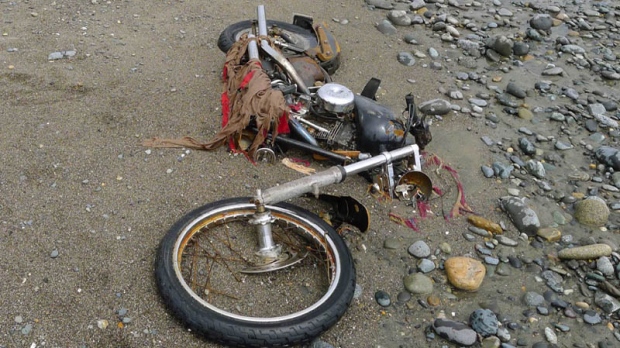A B.C. man got the surprise of his life recently when he looked inside a battered shipping container that had washed up on a remote beach, and found a Harley-Davidson motorcycle.
Even more surprising was the origin of the bike. It had been swept out to sea during the tsunami in Japan, and had somehow travelled 6,500 kilometres across the Pacific Ocean before arriving on B.C.’s Haida Gwai coast.
“It’s pretty strange finding a Harley-Davidson on the beach,” Peter Mark, a resident of Masset on Graham Island, told CTV British Columbia via Skype.
He added: “How the heck did this thing make it across? How did a motorcycle stay in there and actually make it all the way across the Pacific?”
Mark discovered the rusty, salt-damaged bike on April 18 in a shipping container. Because the large, white container was lined with foam, it stayed afloat all the way across the Pacific.
In addition to the bike there was a set of golf clubs, which Mark also salvaged, and other outdoor sports gear which was too badly damaged to be saved.
With the help of Japanese media, using the still-legible license plate from the motorbike, Mark was able to learn the identity of the original owner of the bike — 29-year-old Ikuo Yokoyama.
“I think it’s absolutely spectacular,” Mark said after getting the news. “I’ve been sitting here with my fingers crossed for the last couple of days just hoping the guy can be found and is alive.”
Yokoyama, a resident of the hard-hit Miyagi Prefecture on Honshu Island, lost three family members in the March 2011 tsunami, which is believed to have killed over 15,000 people.
He told Japanese media he was grateful to the Canadian who found his motorcycle, and tracked him down.
“I’m very thankful that it came back,” he said in a television interview. “I’d like to thank the man that found my bike in person but because it’s hard to do that I would like to thank him here and now.”
When the devastating tsunami hit Japan on March 11 of last year, it dragged vehicles, entire buildings, even airplanes and ships out to sea, many of them never to be seen again.
Many of the items, however, became part of a massive debris plume that slowly made its way across the Pacific over the past year. Those items are now beginning to arrive on the West Coast of North America, from Oregon to Alaska.
In early April a so-called “ghost ship” was sunk off the coast of Alaska by the U.S. Coast Guard. The rusty hulk of the Ryou-Un Maru fishing trawler was blasted with cannon fire until it went down in more than 300 metres of water.
Beachcombers on B.C.’s coast have been contacting the Japanese consulate in Vancouver when they find objects that appear to be of Japanese origin.
However, the Japanese Consul-General in Vancouver, Hideki Ito, asked people to consider whether the items are of value, before contacting the consulate.
“Some Japanese people may not want to receive or reunite with their lost objects because they remind them of the tragedy,” he said.
With a report from CTV British Columbia’s St. John Alexander
